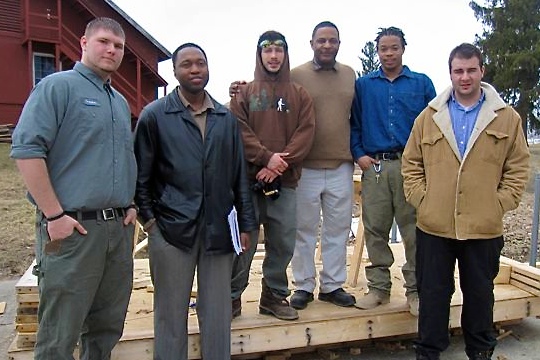Tips on Being Energy Smart from our Carpentry and Facilities Maintenance Students
(L-R) Dominic Fourtin, Mohamed Kamara, Michael Chebetar, Barry Powell, Anthony Sease and Rich Hartt.
Looking to save a bundle on rising energy costs while doing your part to conserve natural resources? The students from Northlands’ carpentry and facilities maintenance trades have some tips to help you do just that.
With a sprawling campus hosting buildings up to 100 years old, the campus of Northlands Job Corps Academy was recently host to two energy auditors looking for ways to save resources—and money.
Barry Powell and Mohamed Kamara of the Arlington, Virginia firm PB Dewberry were contracted by the US Department of Labor to perform an intensive energy audit, and were assisted by carpentry students Michael Chebetar and Dominic Fourtin as well as facilities maintenance students Anthony Sease and Rich Hartt.
“It’s not just good to save energy,” Michael says “it’s financially smart.”
“Just look at the rising fuel costs,” adds Dominic.
Noting that the school has already met many energy-saving challenges, the auditors and the students found some places that could use extra attention. Their suggestions are not solely restricted to academic institutions, and can be applied to residential homes as well.
“By simply switching from standard incandescent light bulbs to newer energy-efficient fluorescent bulbs, you can save a lot of money over a period of time,” says Anthony.
“Investing in double-paned windows is smart,” adds Dominic. “Also, check your insulation. Poor insulation can result in a huge waste of money.”
“If you can feel a draft around doors or windows, or worse yet, if you can see light coming through where it shouldn’t, you need to look at your weather stripping,” says Michael.
Other ideas include installing motion sensors and timers for hallway and bathroom lighting, which ensures that the light is used only when needed.
“We learned that it’s easy to stop wasting water, too, by using low-flow showers and toilets” Rich says.
The students understand that many homeowners don’t necessarily have disposable funds to invest in these energy-saving tactics, but encourage them to consider making small improvements where possible.
“These investments may cost more up front than the money lost to not doing anything,” Anthony says. “But in not too much time the fixes will easily pay for themselves and then you’ll be saving money after that. Quite a bit of money!”
Some energy-saving strategies don’t require a monetary investment at all, but only the willingness to develop new habits. “Simply by unplugging items when they’re not in use, you can save a lot of electricity,” Dominic says.
“I look forward to applying what I’ve learned someday on a house of my own,” Rich adds. “It just makes sense.”
Ian McGaughey


 JOB CORPS
JOB CORPS 